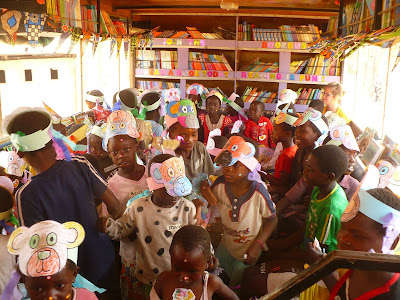We travelled to Chipepwete School in the Nankumba district today.
Matilda, our faithful and trusted bus is back on the road after some minor repairs.
International volunteers Andy and Sarah were delighted, as it’s their first trip out on the ‘real’ BookBus since they arrived at the weekend. Andy even played his guitar to us as the bus climbed up the hilly terrain towards the remote mountain school we were visiting.
Chipepwete has around 440 pupils (or leaners as they are known as here in Malawi), with Standard 1-8 being offered. The school is run by Noel Lunguja a Head Teacher with more than 19 years teaching experience. The school faces many difficulties: poor infrastructure, few teacher or leaner resources, no electricity and it’s water pump is now broken. This means leaners have to walk more than 2kms to get fresh water.
Despite its problems, the learners of Chipepwete are engaged happy and eager to learn.
The BookBus crew were welcomed at the school assembly with the Malawi National Anthem. Each day we all try and remember a few more words so by the time we are going home we can sign it correctly in Chichewa. It has quite an emotional at the end with all the children curtsying.
We split into three groups and each found a spot in the shade.
Sarah’s book choice was ‘Monkey Puzzle’ which was a real hit with the kids from standard 4.
Andy’s group read, “Wheels on the Bus’ (in celebration of Matilda’s return) and the children were then wowed by Andy’s guitar playing whilst singing the infamous ‘Wheels on the Bus song’. Almost the whole school looked on - a record crowd of over 500 for Andy!
Andy singing wheels on the bus in celebration
of having Matilda on the road again!
My group were engrossed in an African fable called Moonshine - a tale of why the moon is silver and cold.
We were all supported by our wonderful local translators Barnes and Chip and even BookBus driver, Douglas also gave a helping hand. Although some children can read English, very few understand what they are reading so translators are essential.
As we work with small groups, we always try and play games at the end of the school morning to involve all the children. Today’s game was goats and hyenas where the hyenas have to catch the goats running around a large circle. The whole school erupted with joy as a pupil from Standard 6 outran Andy and Sarah (he was VERY fast). Eventually the game was won by Sarah and Andy working together as a team!
Chipepwete is a great community school, where teachers, learners and the local community work together to provide the best education they can with what they have and help improve the lives of their children.
The BookBus makes regular visits to the school and we are always welcomed as old friends.
“You’re part of our community, “ said Head Teacher Noel Lunguja “We look forward to your visit and so do all the children. They are always asking me “when is the BookBus coming?’”
As he turned around he had a calendar in his hand so we sat down to plan our next visit…..
- Marian Forkin




















































